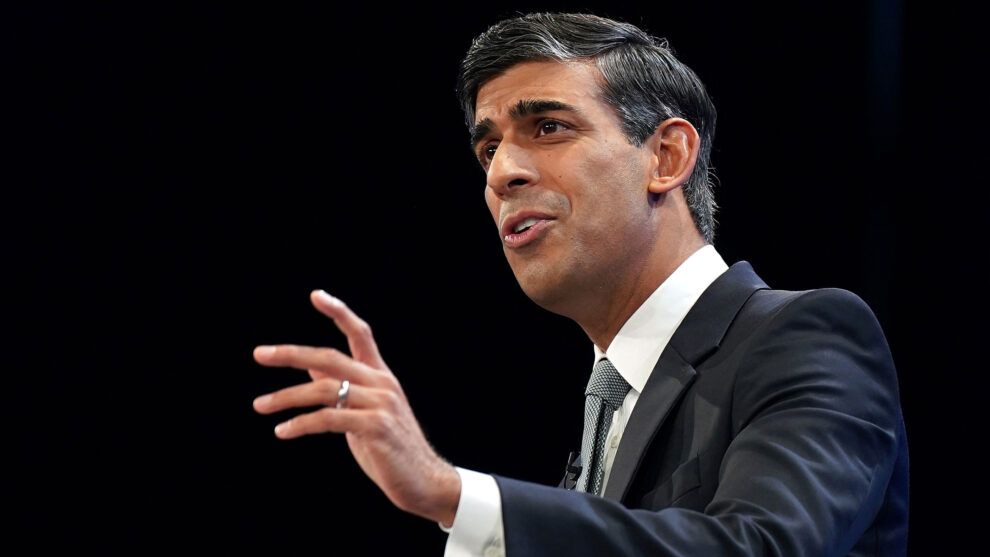Arguing to leave the European Convention on Human Rights will be ‘irresistible’ if the Supreme Court rules against the Government on the Rwanda asylum deal, ministers claim.
Up to a third of Rishi Sunak’s Cabinet already believe he will have to quit the convention if judges block the flagship policy.
Allies of Home Secretary Suella Braverman said she is ready to press for the move immediately if next week’s court case goes against the Government.
One minister told the Mail: ‘We have a very strong case. The only possible basis for refusal would be a distorted and stretched interpretation of the ECHR. If that happened, then the case for leaving would be irresistible.’
On Monday, Supreme Court justices will hear Home Office lawyers argue that legal blocks on the scheme should be lifted.

The Mail understands that ministers are drawing up emergency legislation that would attempt to carve out illegal migration from the jurisdiction of the ECHR in the event of a Supreme Court defeat.
Sources close to Mrs Braverman believe a ‘halfway house’ option would be to exclude illegal migrants from the remit of human rights laws.
Parliament would be asked to pass the new measures revoking the ECHR in all cases involving small boat migrants and other ‘irregular’ arrivals.
It would mean unelected judges at home and abroad could no longer interfere in Parliament’s decisions on illegal migration.
However, the legislation would be ‘very difficult’ to get through in the time available before the next general election.
It must be passed before January 2025, sources said – raising the prospect the idea could be put in the next Tory manifesto.
If the Rwanda scheme is given the go-ahead by British courts, the European Court of Human Rights could still attempt to block it with an interim injunction.
An interim injunction could be ignored under measures in the new Illegal Migration Act earlier this year.
However, senior Tories believe Attorney General Victoria Prentis could try and block the move.
It would leave the Prime Minister with the choice of giving in to the European court or overruling the Government’s chief law officer.
He said this week that he was willing to do ‘whatever is necessary’ to get Rwanda flights off the ground.
But Downing Street declined to say whether this includes leaving the ECHR.
The £140million Rwanda scheme was declared unlawful on human rights grounds by the Court of Appeal in June.
The policy would see some illegal immigrations or asylum seekers sent to the east Africa nation on a one-way ticket, to claim asylum there.
In a further development, ministers now believe the first Rwanda flights will not take place until Easter even after a potential Home Office victory in the courts.
It would take ‘several months’ to select and process migrants to be removed, sources said.
Insiders expect lawyers for migrants would launch a series of ‘micro appeals’ in the courts despite the Illegal Migration Act – passed by Parliament earlier this year – severely limiting their legal options.
On trip to Kigali earlier this year, Mrs Braverman said she hoped removal flights would be operating by the summer. Last month, Christmas was floated as a possible start date.
Now it is likely the first flights would not get off the ground before Easter Sunday, which next year falls on March 31.
Regardless of whether the Home Office win or lose the Supreme Court appeal, ministers believe the Government’s opponents will take further legal action in Strasbourg.
Cases normally take years to reach the court, but it could rush through a hearing on Rwanda in an overtly political move designed to spite the Government.
If the case progresses to a full hearing in Strasbourg, the court would likely rule against the Government.
The most likely grounds for defeat in the courts, sources believe, would be a ‘distorted and stretched’ interpretation of Article 3 of the ECHR, which prohibits torture and ‘inhuman or degrading treatment or punishment’.
The Supreme Court hearing on Rwanda is expected to last several days with a ruling due six to eight weeks later.
Source : Daily Mail











